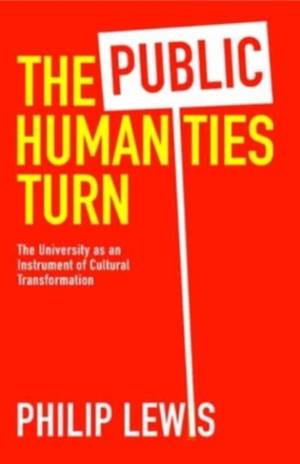
- Retrait gratuit dans votre magasin Club
- 7.000.000 titres dans notre catalogue
- Payer en toute sécurité
- Toujours un magasin près de chez vous
- Retrait gratuit dans votre magasin Club
- 7.000.0000 titres dans notre catalogue
- Payer en toute sécurité
- Toujours un magasin près de chez vous
The Public Humanities Turn
The University as an Instrument of Cultural Transformation
Philip LewisDescription
Humanities have the potential to transform human culture--and an obligation to preserve it.
In The Public Humanities Turn, Philip Lewis argues that universities are uniquely equipped to act as catalysts for cultural change in the face of the climate crisis. In closely linked essays that explore the evolution of the academic humanities in the era of climate change, he foregrounds the rise of the public humanities, a movement that has been gaining momentum over the past two decades.
Surveying a variety of approaches to the public humanities, Lewis relates their emergence to the evolution of higher education and its achievements, problems, and goals. Current academic efforts to engage with the public at large, led by scholars with interdisciplinary commitments, are significant yet far from sufficient. Situating the university as a global institution, Lewis contends that it faces an urgent imperative to collaboratively address common needs and looming crises in a public-facing initiative that integrates the arts, humanities, and social sciences and draws them into a future-oriented dialogue with earth systems science.
Advocating for the urgent educational mission of safeguarding humanity's survival on a habitable earth, Lewis proposes a sharpened focus for the public humanities that would position universities as active agents of cultural transformation. The Public Humanities Turn is a clarion call for institutional and cultural change and a must-read for anyone interested in the humanities, climate change, activism, organizational reform, and the future of higher education.
Spécifications
Parties prenantes
- Auteur(s) :
- Editeur:
Contenu
- Nombre de pages :
- 280
- Langue:
- Anglais
Caractéristiques
- EAN:
- 9781421448725
- Date de parution :
- 16-04-24
- Format:
- Livre relié
- Format numérique:
- Genaaid
- Dimensions :
- 141 mm x 223 mm
- Poids :
- 449 g

Les avis
Nous publions uniquement les avis qui respectent les conditions requises. Consultez nos conditions pour les avis.






